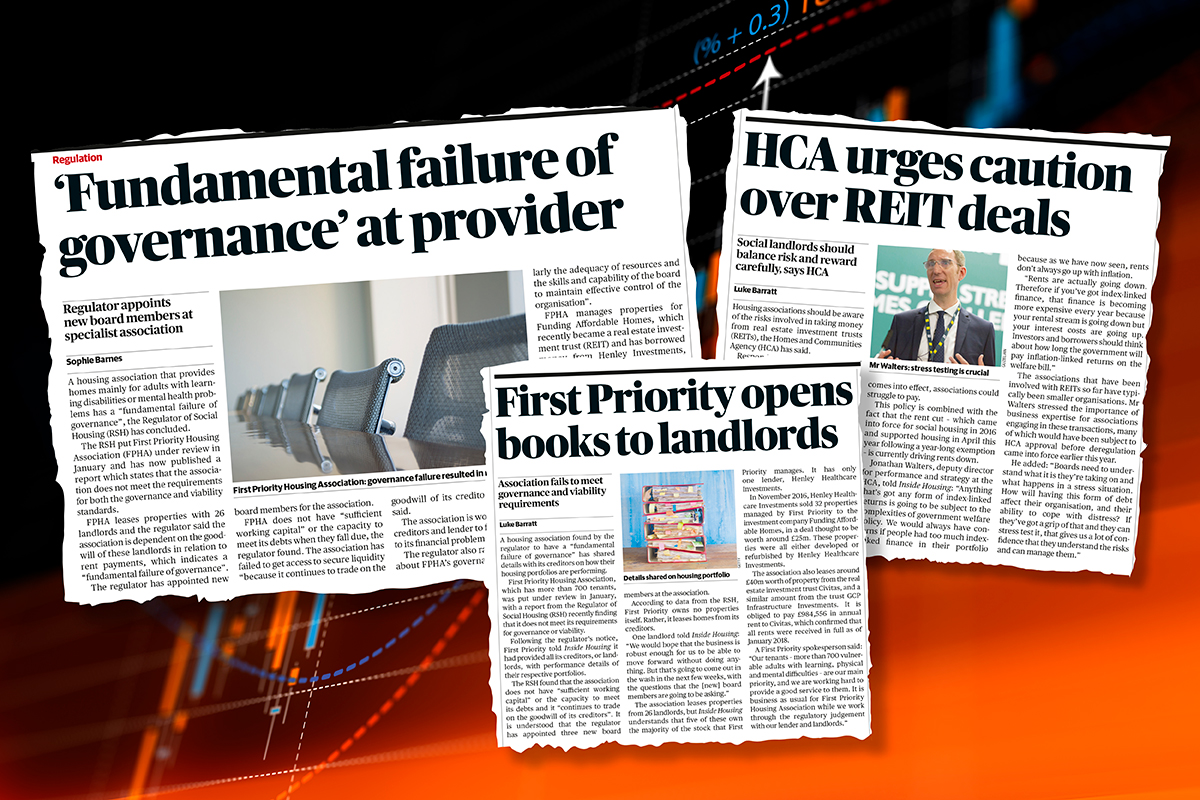You are viewing 1 of your 1 free articles
Private equity-linked association slammed over ‘inherent conflicts of interest’
A private equity-linked housing association has “inherent conflicts of interest” and is not compliant with the Regulator of Social Housing’s standards, according to a judgement issued today.
Westmoreland Supported Housing Association is the third such association to be declared non-compliant, after First Priority and Trinity were each slammed for a “fundamental failure of governance”.
The regulator gave the 1,379-home association a G3 rating for governance and a V3 rating for financial viability, both non-compliant ratings.
According to the regulator, Westmoreland, which operates in 107 local authorities, is reliant on financial support from “a third party”, understood to be the aggregator Fairhome Group.
In its judgement (attached below), the regulator said: “There are inherent conflicts of interest at board level. The chair of Westmoreland is employed in a senior role by the same third party that is providing the cash support, management services and sourcing properties as part of Westmoreland’s growth strategy.
“The board has yet to provide compelling evidence that appropriate probity policies and arrangements were in place to effectively manage these conflicts.
“In the absence of evidence, it is reasonable to assume that these arrangements, while giving a level of financial support, could be inappropriately advancing the interests of a third party.”
The chair of Westmoreland is John Russell, who is also the chair and founder of Fairhome, the “third party” referenced in the judgement.
Inside Housing understands Fairhome is an aggregator, whose business involves sourcing supported living homes, packaging them with long-term lease deals, finding housing associations willing to take them on and presenting these as investment opportunities to real estate investment trusts (REITs) and private equity funds in exchange for a fee.
The regulator’s judgement also criticised Westmoreland for its handling of a set of evictions, understood to be from a scheme in Gloucester owned by the fund Henley Healthcare Investments (HHI).
Related Files
Inside Housing reported in September that the tenants expressed concerns when they were served with eviction notices, saying they would be made homeless if forced to move out.
According to the judgement, Westmoreland issued these eviction notices “to enable it to hand back properties rather than carrying out a more managed process”.
The regulator criticised Westmoreland’s handling of the situation, saying it led to a “sub-optimal outcome”.
Westmoreland is one of the largest private equity-linked housing associations but according to the regulator it does not develop new housing, instead acquiring properties under long-term leases. It has struck deals with the social housing REITs Civitas and Triple Point, as well as HHI.
Lease payments from Westmoreland to Civitas account for 17% of the REIT’s rental income, amounting to around £6.3m a year.
In an update to the stock market, Civitas said: “As part of our overall monitoring activities with Westmoreland, we are actively engaged both with Westmoreland itself and with the outsource and other service providers including care providers and local authorities.
“Westmoreland has also provided assurance that they believe that matters relating to health and safety are up to date and should be considered compliant and that any potential for conflicts of interest are both fully disclosed and appropriately managed.”
Triple Point, which has £22.2m worth of homes leased to Westmoreland, also issued a stock market update, saying: “Westmoreland is working with advisors and the regulator to produce and implement a financial and governance improvement action plan in order to address the regulator’s concerns.
“Westmoreland has also voluntarily decided to appoint an independent board member and amend the governance arrangements of its board in order to address the regulator’s concerns around conflicts of interest and is improving the quality of information provided to senior management.
It added: “Following conversations with [the valuer Jones Lang LaSalle], the manager and the board estimate that the potential impact of Westmoreland’s rating on the company’s net asset value would be less than 1%.
A Fairhome spokesperson said: “We are fully aware of the issues raised by the regulator and understand the need for clarity of roles in the sector. Our relationship with Westmoreland is based on a partnership of creating excellent ‘whole-life’ accommodation for society’s most vulnerable people.”











